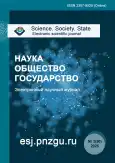Cultural and moral security of the Russian Federation: constitutional and legal aspect
- Authors: Goshulyak V.V.1
-
Affiliations:
- Penza State University
- Issue: No 2 (2025)
- Pages: 68-75
- Section: PUBLIC LEGAL (STATE LEGAL) SCIENCES
- URL: https://journal-vniispk.ru/2307-9525/article/view/301160
- DOI: https://doi.org/10.21685/2307-9525-2025-13-2-7
- ID: 301160
Cite item
Full Text
Abstract
Background. The relevance of the research topic is determined by its scientific, theoretical and practical significance. From a scientific and theoretical point of view, studying this problem allows us to deepen our understanding of Russia's national security as a systemic problem involving internal and external threats. In practical terms, the topic is significant from the point of view of developing practical recommendations for improving Russian legislation, taking into account the introduction of the institute of cultural and moral security. Materials and methods. The article uses a wide range of legal sources relevant to the research topic. The research methods used were logical, historical, method of analysis and synthesis, dialectical method, civilizational approach. Results. The article substantiates the idea of distinguishing cultural and moral security as an independent type of national security of the Russian Federation and including it as an independent legal institution in certain branches of public law. Conclusions. Traditional values are based on the cultural and moral values of our people, formed from religious beliefs, folk traditions and customs, expressing the national and cultural identity of representatives of the Russian civilization. Traditional values are cultural and moral guidelines passed down from generation to generation, forming the national identity of the multinational people of the Russian Federation. The consolidation of spiritual and moral values in the Constitution of the Russian Federation means that our state considers them to be the most important and most significant for civil society and takes them under its legal.
About the authors
Vitaly V. Goshulyak
Penza State University
Author for correspondence.
Email: vvgoshulyak@rambler.ru
Doctor of Law, Doctor of Historical Sciences, Professor, Director of the Institute of Law
40 Krasnaya street, Penza, 440026References
- Gir'ko S.I. Development and regulation of the legal basis for national security of the Russian Federation: chronology and continuity. Administrativnoe pravo i protsess = Administrative law and process. 2024;(4):21–26. (In Russ.). doi: 10.18572/2071-1166-2024-4-21-26
- Dudin N.M. Political stability as a means of national security of Russia. Gosudarstvennaya vlast' i mestnoe samoupravlenie = State power and local self-government. 2023;(5):29–33. (In Russ.). doi: 10.18572/1813-1247-2023-5-29-33
- Moshkina N.A. An integrated approach to ensuring national security of the Russian Federation in the context of sanctions pressure. Bezopasnost' biznesa = Business security. 2024;(4):39–43. (In Russ.). doi: 10.18572/2072-3644-2024-4-39-43
- Nudel' S.L. Criminal-legal mechanisms for ensuring national security. Zhurnal rossiyskogo prava = Journal of Russian law. 2023;27(11):62–74. (In Russ.). doi: 10.61205/jrp.2023.128
- Tarabukin V.V. On updating the issues of modernization and adjustment of the mechanism for implementing legal policy in the sphere of ensuring national security. Yurist = Lawyer. 2024;(9):49–54. (In Russ.). doi: 10.18572/1812-3929-2024-9-49-54
- Sharonov S.A., Shapovalov Ya.A. Private law means of ensuring national security of Russia. Tsivilist = Civilist. 2024;(1):37–42. (In Russ.)
- Nesmeyanova S.E. On the issue of the hierarchy of constitutional values. Pravovaya paradigma = Legal paradigm. 2017;16(4):71–74. (In Russ.). doi: 10.15688/lc.jvolsu.2017.4.9
- Evdokimov V.B., Mochalov A.N. Constitutional values in the constitutions and charters of the subjects of the Russian Federation. Zhurnal rossiyskogo prava = Journal of Russian Law. 2021;25(5):28–42. (In Russ.). doi: 10.12737/jrl.2021.058
- Bredikhin A.L. National idea: state and legal aspect. Gosudarstvennaya vlast' i mestnoe samoupravlenie = State power and local self-government. 2021;(3):18–21. (In Russ.). doi: 10.18572/1813-1247- 2021-3-18-21
- Marks K. Vosemnadtsatoe bryumera Lui Bonaparta. S predisl. F. Engel'sa k 3-mu nem. izd., pod obshch. red. V.V. Adoratskogo = The Eighteenth brumaire of Louis Bonaparte. With preface by F. Engels to the 3rd German edition, under the general editorship of V.V. Adoratsky. Moscow: Part. izd-vo, 1932:110. (In Russ.)
- Tereshchenko N.K. (resp. ed.). Gosudarstvo, obshchestvo i lichnost': puti preodoleniya vyzovov i ugroz v informatsionnoy sfere: monografiya = State, society and personality: ways to overcome challenges and threats in the information sphere: monograph. Moscow: Institut zakonodatel'stva i sravnitel'nogo pravovedeniya pri Pravitel'stve Rossiyskoy Federatsii, 2024:352. (In Russ.)
- Sabaeva S.V. The role and place of spiritual and cultural (civilizational) security in the national security system of the Russian Federation. Administrativnoe pravo i protsess = Administrative law and process. 2023;(8):30–34. (In Russ.). doi: 10.18572/2071-1166-2023-8-30-34
- Meshcheryakova A.F. Religious security as a subject of constitutional and legal regulation. Konstitutsionnoe i munitsipal'noe parvo = Constitutional and municipal law. 2024;(6):20–24. (In Russ.). doi: 10.18572/1812-3767-2024-6-20-24
- Tarasevich I.A. Religious security of the Russian Federation as an object of constitutional and legal research. Probely v rossiyskom zakonodatel'stve = Gaps in Russian legislation. 2014;(2):23–25. (In Russ.)
Supplementary files

















